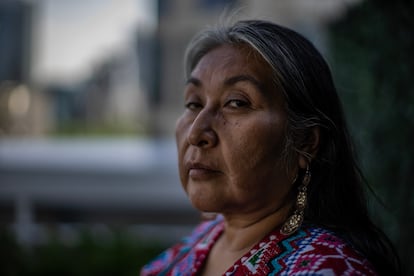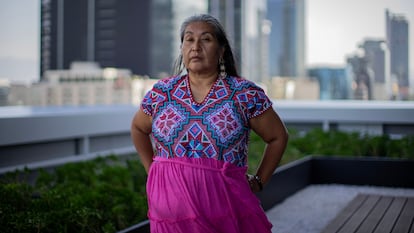The tenacious woman who provides indigenous language interpreters all over the US
Odilia Romero and her organization want to help hospitals, police stations, courts and schools in Los Angeles and other cities to communicate better

The Los Angeles Police Department has phonetic cards that enable officers to ask, albeit awkwardly, if someone speaks Zapotec, Chinantec, Mixtec and other indigenous languages. The cards help them assist people who don’t speak Spanish or English, in a metropolitan area where 17 indigenous languages are spoken. It’s one small victory in the struggle for linguistic justice that Odilia Romero has championed with Cielo, the organization she founded 10 years ago to prevent tragic incidents like the death of Manuel Jazmines Xum, an immigrant worker from the Ki’ché ethnic group who was shot by police officers when he didn’t respond to their orders in English and Spanish, orders that he couldn’t understand. Or Rita Quintero, a Rarámuri woman who was confined for 12 years in a Kansas institution and given psychotropic medication because the police officers who detained her assumed she had mental health problems when she said things like, “I come from the sky.”
“Language is at the root of all our struggles”
“Language is at the root of all our struggles and the fundamental pillar of our rights,” said Romero, an activist who works with her daughter, Janeth Martínez, to defend ancestral languages and push for public institutions in Los Angeles – police, school districts, children’s hospitals, health services – to provide interpretation services for the most commonly spoken indigenous languages in the area.

“Access to an interpreter is a basic human right. Our lives are shaped by words and even a single word can have a huge impact. Without the right context, someone could lose their freedom, get deported or even worse, lose a life. It all comes down to this one thing – language,” said Romero. Her organization provides interpreters of over 350 dialects to 27 US states.
Identifying and mapping the comprehensive count of indigenous languages spoken in the United States is a very difficult endeavor. Upon their arrival in the country, indigenous people, regardless of their country of origin (Mexico, Guatemala, Honduras…) and legal standing (regular or irregular) are promptly classified as Hispanic or Latino. It’s a diverse and heterogeneous community, and this process of “Latinization” swiftly erases identities that don’t neatly align with the checkboxes on immigration, hospital and police forms. It not only erases their language but also the essence of their cultural heritage and identity.”We don’t have any data on indigenous communities, which makes linguistic violence even more harsh. There’s this assumption that if you’re Latino, you must speak Spanish,” said Romero.
Training interpreters is a long and arduous process, says Romero, who is from the San Bartolomé Zoogocho community in the state of Oaxaca (southwest Mexico). She arrived in the United States speaking only her ancestral language – no Spanish or English. “It’s not just about speaking the indigenous language and translating it into Spanish or English in courts, police stations and hospitals,” said Romero. “They need to be trained in the legal and medical systems of each country because jurisdictions and procedures differ greatly. Plus, when you convey an idea from an indigenous language to Spanish and then to English, there’s a big risk of losing crucial details.”
A significant obstacle in the pursuit of linguistic justice in the United States is the extensive array of dialects inherent to indigenous languages themselves, adding complexity to an already challenging task. “There are actually more than 100 variants of Zapotec, and here’s the catch – they’re not all mutually understandable,” said Romero. “So, whenever a court reaches out to us for a Zapotec interpreter, we’re faced with the question – which Zapotec dialect is needed? To answer that, we need to dig into the person’s community and their roots. This tends to slow things down, like trials and medical attention.”
Services that reflect the crises in American indigenous communities
The influx of indigenous migrants in the United States varies according to rapidly changing geopolitical dynamics. “Now we’re seeing a huge demand for interpreters to communicate with the Miskito indigenous people from Nicaragua. They’re being forced to leave their land, and the same thing is happening to the Garifuna people from Honduras, and the indigenous people of the Amazon in Brazil. Our services are evolving as the conflicts facing our communities grow,” said Romero.

Despite the challenges, Odilia Romero has remained steadfast in her dedication. The reason behind her commitment is abundantly clear – she is wholeheartedly invested in this cause. Her parents migrated north when she was a young child and left her in the care of grandmothers. After a few years, she had a chance to join them, and left her grandmothers, village, language and homeland. Twice separated, the experience had a profound influence on shaping her future.
“I ended up becoming my parents’ interpreter, kind of like La Malinche, the 13-year-old slave girl who was forced to interpret [for conquistador Hernán Cortéz]. This is still happening today. There are so many kids out there interpreting for their families because they speak an indigenous language that nobody recognizes or teaches,” said Romero, who has been tirelessly fighting to eliminate linguistic violence. “You have to resist and get creative with what the system gives you. That’s why we do more than just translation services. We’re out there, helping with vaccinations, groceries – you name it. Anything that can bring human rights, dignity and respect to our communities.”
Sign up for our weekly newsletter to get more English-language news coverage from EL PAÍS USA Edition
Tu suscripción se está usando en otro dispositivo
¿Quieres añadir otro usuario a tu suscripción?
Si continúas leyendo en este dispositivo, no se podrá leer en el otro.
FlechaTu suscripción se está usando en otro dispositivo y solo puedes acceder a EL PAÍS desde un dispositivo a la vez.
Si quieres compartir tu cuenta, cambia tu suscripción a la modalidad Premium, así podrás añadir otro usuario. Cada uno accederá con su propia cuenta de email, lo que os permitirá personalizar vuestra experiencia en EL PAÍS.
¿Tienes una suscripción de empresa? Accede aquí para contratar más cuentas.
En el caso de no saber quién está usando tu cuenta, te recomendamos cambiar tu contraseña aquí.
Si decides continuar compartiendo tu cuenta, este mensaje se mostrará en tu dispositivo y en el de la otra persona que está usando tu cuenta de forma indefinida, afectando a tu experiencia de lectura. Puedes consultar aquí los términos y condiciones de la suscripción digital.








































